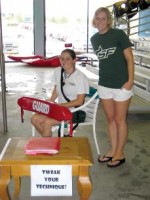Swimming enthusiasts tweak their technique

Like gymnastics or diving, swimming is one of few sports whose mastery is affected drastically by even the smallest changes in form. Beginner and expert swimmers alike know that the difficulty of moving smoothly through the water increases if arms, hands and other body parts are not placed carefully and with correct timing.
Members of the aquatics staff at USF’s campus recreation center have recently developed a program to address these difficulties. Tweak Your Technique – a stroke development program designed to help people who can swim but need improvement – is offered free of charge Monday through Thursday from noon to 1 p.m.
Kristine Fallon, a first-year graduate student in exercise science and graduate assistant at the aquatics center, said so many of the Center’s regular swimmers were asking for this type of advice that she was inspired to develop the program.
Assistant Director of Campus Recreation Kimberly Mallard said the program is part of a larger effort to accomplish two goals: they would like to expand their patronage, but more importantly, they would like to build relationships with members of the USF community – students and non-students alike – who use the pool.
“It’s (about) building relationships with people and letting them know we’re here to help,” Mallard said. “We want to bring in new people, too, who aren’t so confident in their swimming ability, or need a little encouragement.”
She estimates that about 2,500 people – including students, faculty, staff and others – use the aquatics center every week during the fall and winter months.
Brianne Northcutt, Jeff Keely and Ashley Ballester, the three Tweak Your Technique instructors, are all certified American Red Cross Water Safety Instructors as well, Fallon said. Some, like Northcutt, a senior, have extensive experience as competitive swimmers as well. She has been teaching students 3 years old and up how to swim for five years, and swam during all four years of high school.
“We give people the tools they need to build their skills,” she said.
Recreational swimmers feel the program will be useful as well. Roger Peters, chair of the department of mental health, law and policy, has been swimming at USF three days a week for more than 20 years.
“I think it (will) be a very useful program,” he said. “There are a lot of people who swim routinely several times a week who’ve never taken formal lessons.”
Could he use some advice on his strokes?
“I think it would be good to have a couple of tips to work on,” Peters said.
Bill Covert, a sophomore, has been coming to the pool five days a week for a year to prepare for Special Tactics training in the U.S. Air Force. He agreed his technique could benefit from the class.






